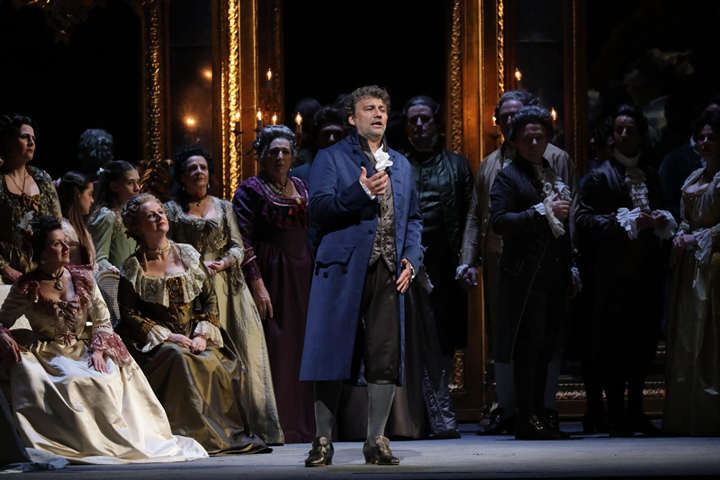| Opera Reviews | 2 May 2024 |
Jonas Kaufmann brings star power to Andrea Chénierby Silvia Luraghi |
|
Giordano: Andrea Chénier |
|

Jonas Kaufmann (Andrea Chénier), Ensemble
|
|
|
The last few performances of Umberto Giordano’s Andrea Chénier revival saw the much expected visit of star tenor Jonas Kaufmann, who replaced Yusif Eyvazov in the title role. In spite of limited rehearsals, the singer adapted perfectly to the production and was very compelling theatrically. The vocal performance was somewhat uneven, with a positive start in “Un dí ll’azzurro spazio” and an even better end in “Come un bel dí di maggio” and then in the final duet. In the course of the performance he sounded at odds in “Ora soave”, which he started in pianissimo, a choice that turned out to create problems for his emission. At his side, soprano Sonya Yoncheva, who sang in all of the performances, proved to be more than adequate as Maddalena di Coigny, changing her interpretation from the cheeky girl of the first act to a more mindful young woman in the rest of the opera. Vocally she displayed a firm middle range and a well tuned high register, while in the lower range the voice changed color and the emission sounded forced. To my mind, the best singer on stage was baritone Amartuvshin Enkhbat, also a latecomer to the production. As soon as he opened his mouth in the first act he made clear what sort of authoritative Carlo Gérard he was going to portray, and his aria “Nemico della patria” was the hit of the evening, earning several minutes of applause. All other cast members were on a high level. Among them, special mention is deserved by mezzo Francesca Di Sauro, a sympathetic Bersi, and veteran soprano Elena Zilio in the cameo role of Madelon. The 2017 Mario Martone production was revived by Federica Stefani. I liked it when I saw it the first time and can only confirm my first impression: the revolving sets designed by Margherita Palli, with the help of the historical costumes by Ursula Patzak, offered a perfect setting for the variety of locations in which the action is set: the palace of Countess Coigny, the streets of Paris swarmed by the revolutionaries, Gérard’s home, the revolutionary tribunal, the jail from which Chénier and Maddalena are brought to the guilliotine. I again appreciated the decision to only have one intermission between the second and the third act, rather then several long intermissions as it is most often the case at La Scala. The orchestra was conducted by Maestro Marco Armiliato, who showed a perfect control of the score. Some members of the audience complained for the volume, but in fact the orchestra never covered the voices, and I found criticisms far fetched. The performance ended with cheers and applause for all the singers.
|
|
| Text ©
Silvia Luraghi Photo Brescia e Amisano © Teatro alla Scala |
|







